Céline Dion Details Scary Stiff-Person Syndrome Symptoms Going Back 17 Years: ‘I Was Going Down, Down, Down' (Exclusive)
In PEOPLE's latest cover story, the superstar opens up about her fight to perform again, staying strong for her sons and inspiring others with a new documentary
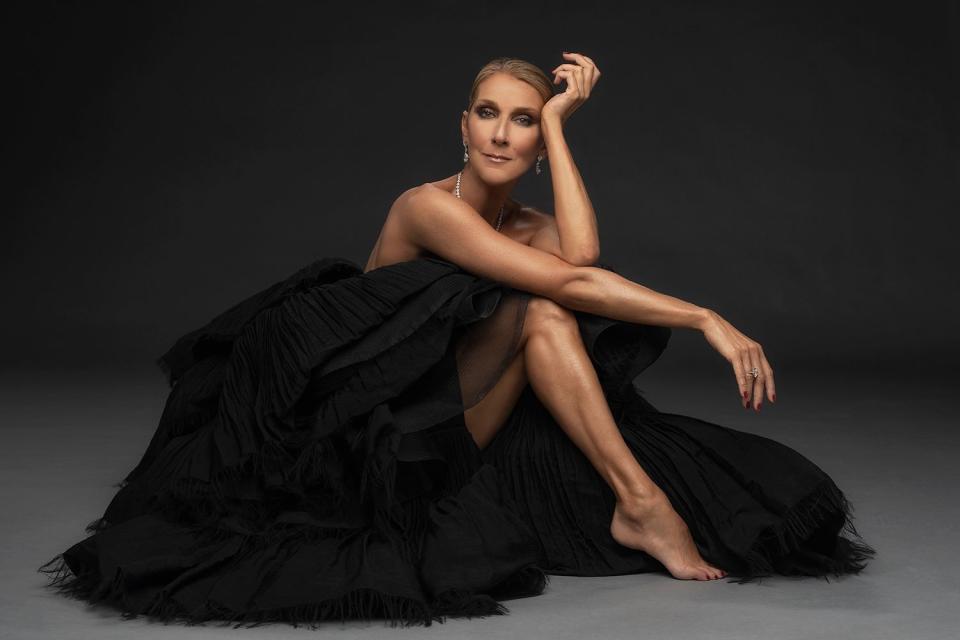
Denise Truscello
Céline DionCéline Dion felt the walls closing in.
As she headed to a pre-show fan meet and greet, "suddenly I started to feel the corridor getting narrower and narrower," she recalls exclusively to PEOPLE in its latest cover story of the terrifying experience that happened during her second Caesars Palace concert residency, which drew more than two million fans during its eight-year-run from 2011-2019. "I'm holding onto the wall, and I'm like, 'What is happening?'"
The superstar sat for a moment, assumed she had a drop in blood sugar and downed an orange juice. Then, as she has done all her life, insisted the show must go on.
"I said, 'The people have been waiting!'" remembers Dion, who lifts the veil on the last few years of her life — during which she rarely left her house amid her ongoing fight with stiff-person syndrome — in a revealing new documentary, I Am: Celine Dion (streaming globally June 25 on Prime Video).
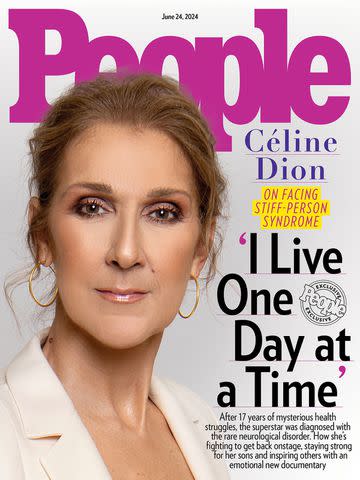
Related: Céline Dion Reveals Diagnosis with Rare Neurological Disease Called Stiff-Person Syndrome
But what felt to the singer like 10 minutes actually had been two hours: "They said, 'Céline, the show has been canceled. People are gone.'"
The "hole" in her memory, as Dion, 56, described to PEOPLE over a Zoom call in early June from her home in Las Vegas, was just one of many mysterious and increasingly concerning symptoms she began privately grappling with in the mid 2000s.
As she recorded multiple albums and performed back-to-back sold-out tours and residencies, the five-time Grammy winner did everything she could to power through muscle spasms in her throat and feet, difficulty breathing and walking, vision issues and, most severely, "crisis" episodes during which her body became stiff as a board as she endured excruciating pain.
"I was going down, down, down. It took my whole life. But it's like if my kids are rollerblading, for example, and one of their ankles is hurting. They don't want to tell me because I'm going to say, 'Well, take a break from rollerblading,'" she explains of why she held off on digging deeper into her health struggles. "I didn't want to stop. I wanted to stay onstage. I wanted to be brave instead of smart. That was wrong."
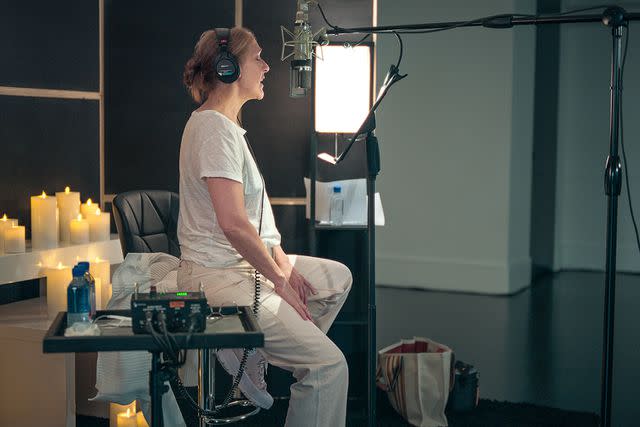
Courtesy of Prime Video
'I Am: Céline Dion' film stillAfter delaying a new residency in late 2021 and postponing, then canceling, a series of European concert dates, Dion revealed in a tearful December 2022 Instagram video that she had been diagnosed with SPS, a rare and progressive autoimmune and neurological disorder that can cause muscle rigidity, mobility issues, painful spasms and shortness of breath.
"While people were holding on to their tickets, I was holding on to my dear life," she says.
For more on Céline Dion's fight to get back to the stage following her stiff-person syndrome diagnosis, how she's staying strong for her sons and raising awareness with a revealing new documentary, pick up the latest issue of PEOPLE, on newsstands Friday, June 14.
When Academy Award-nominated director Irene Taylor first signed on to direct I Am: Celine Dion, she had expected to follow the star as she prepped for a world tour. Taylor learned of Dion's August 2022 diagnosis during pre-production, and Dion still allowed her to let the cameras roll.
"Even if it involved her suffering, like physical suffering or emotional anguish, she did not ask me to stop filming. She let me know that she trusted me. And I trusted her because I really could see she was not trying to hide anything from me," says Taylor, who has made two documentaries about her family's journey through deafness, 2007's Hear and Now and 2019's Moonlight Sonata: Deafness in Three Movements.
"I know the sacredness of family privacy. I know the sacredness of bodily privacy. And yet I truly believe in my heart as an artist that the more someone will let me in, I do want to share that," continues Taylor. "What happens in this film is truly extraordinary, and it might give people a new perspective on a very unknown disease."
Adds Dion: "I hope it gives people strength. A lot of people are going through things alone for many, many, many years."
After 17 years of pushing aside — and through — her physical struggles, Dion was fueled by the love she has for her and her late husband René Angélil's three sons, René-Charles, 23, and 13-year-old twins Nelson and Eddy, to finally prioritize her health.
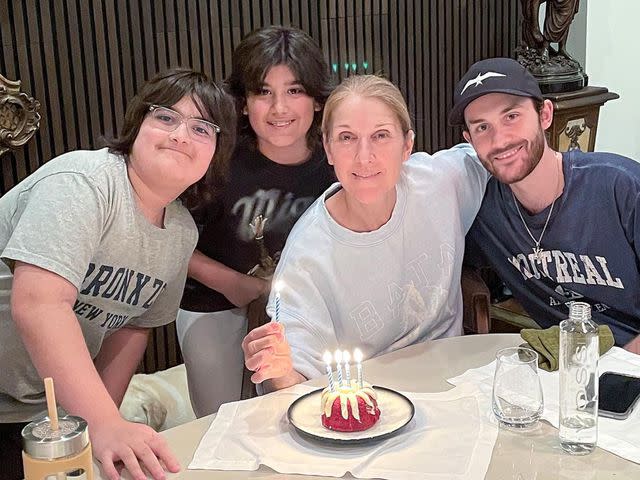
Celine Dion Instagram
Dion with her sons Eddy, Nelson and René-Charles"My vocal cords used to lead my way, and now I can't even just talk with them. I barely could walk, and I was missing very much living," she says. "My kids started to notice. I was like, OK, they already lost a parent. I don't want them to be scared."
While there isn't currently a cure, Dion says her diagnosis brought relief to her family. "I let them know, 'You lost your dad. Mom has a condition, and it's different. I'm not going to die,'" she recalls of telling her kids about the illness, which is not fatal and can be managed with treatment. "By knowing what I'm dealing with, it takes away a lot of weight and burden, and it did the same for my kids."
Having the disease impact her ability to sing has been especially cruel for Dion, who knew since an early age her calling was to perform and has been beloved for decades for her soaring ballads and inimitable stage presence.
Over the last two years, Dion has been following a combination treatment plan involving medication, immune therapy, vocal therapy and intense physical rehabilitation five days a week.
"The good thing that's on my side is that I love doing all these things," she says, grinning. Dion is unwaveringly resilient, but Dr. Amanda Piquet, who serves as director of the autoimmune neurology program at the University of Colorado and is the physician who diagnosed Dion, emphasizes how strenuous her treatments are. "It's a full-time job," Piquet says. "She is incredibly determined."
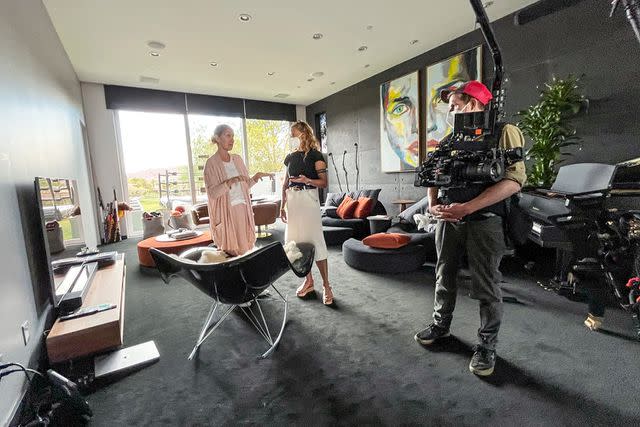
Courtesy of Prime Video
Dion with director Irene Taylor and a cameraman at home in Las VegasDion knows her fans are eager to see her back onstage, and their support motivates her. Returning to the recording studio for the first time in years was "very, very, very challenging," she says.
"I don't want to sound pretentious, but [singing] has never been difficult. I got scared that it was harder. I was like, that's not supposed to be hard," she continues.
Still, she refuses to let fear dictate her future. "I have a wonderful coach vocally, and physically [my treatment plan] is making such a difference," she says.
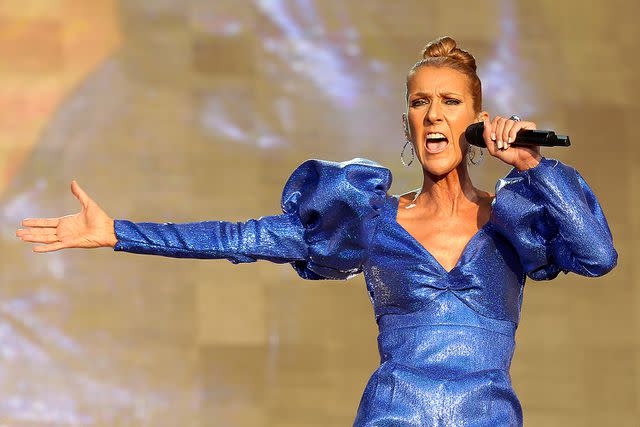
Simone Joyner/Getty
Dion performing in 2019While there's no timeline for her professional return, Dion says, "We're talking about putting a show together, and I have so many ideas. I can't wait."
She's also found new purpose — both to raise awareness about SPS in hopes of finding a cure, and to encourage others struggling silently to seek help.
"If I would have just stayed secretly behind, my home would have become a prison, and I would have become a prisoner of my own life," she says. "Today, I live one day at a time. The fact that I found the strength to communicate my condition with the world makes me very proud. Maybe my purpose in this life is to help others, and that is the greatest gift."
For more People news, make sure to sign up for our newsletter!
Read the original article on People.


